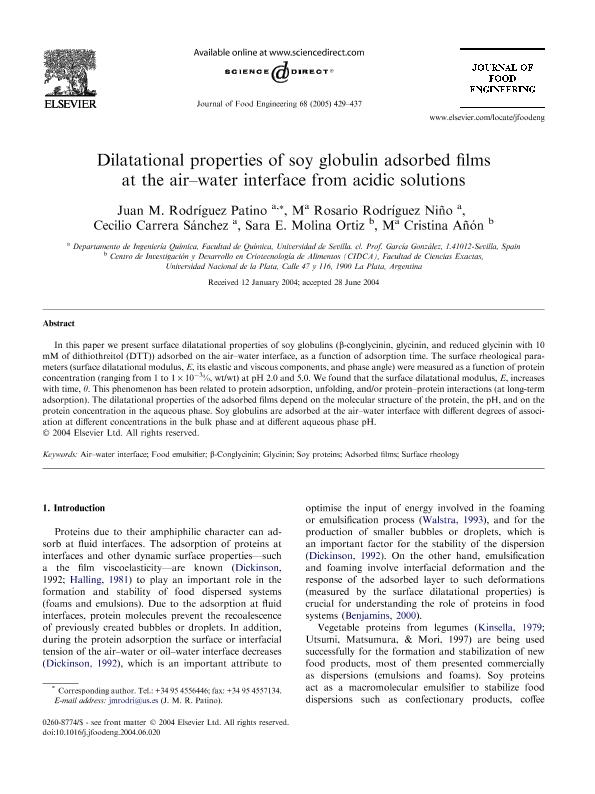Mostrar el registro sencillo del ítem
dc.contributor.author
Rodríguez Patino, Juan M.
dc.contributor.author
Rodríguez Niño, María Rosario
dc.contributor.author
Carrera Sánchez, Cecilio

dc.contributor.author
Molina Ortiz, Sara Eugenia

dc.contributor.author
Añon, Maria Cristina

dc.date.available
2022-06-03T13:23:05Z
dc.date.issued
2005-06
dc.identifier.citation
Rodríguez Patino, Juan M.; Rodríguez Niño, María Rosario; Carrera Sánchez, Cecilio; Molina Ortiz, Sara Eugenia; Añon, Maria Cristina; Dilatational properties of soy globulin adsorbed films at the air–water interface from acidic solutions; Elsevier; Journal of Food Engineering; 68; 4; 6-2005; 429-437
dc.identifier.issn
0260-8774
dc.identifier.uri
http://hdl.handle.net/11336/158845
dc.description.abstract
In this paper we present surface dilatational properties of soy globulins (b-conglycinin,glycinin, and reduced glycinin with 10 mM of dithiothreitol (DTT)) adsorbed on the air–water interface,as a function of adsorption time. The surface rheological parameters (surface dilatational modulus, E,its elastic and viscous components,and phase angle) were measured as a function of protein concentration (ranging from 1 to 1 · 103%,wt/wt) at pH 2.0 and 5.0. We found that the surface dilatational modulus, E,increases with time, h. This phenomenon has been related to protein adsorption,unfolding, and/or protein–protein interactions (at long-term adsorption). The dilatational properties of the adsorbed films depend on the molecular structure of the protein,the pH,and on the protein concentration in the aqueous phase. Soy globulins are adsorbed at the air–water interface with different degrees of association at different concentrations in the bulk phase and at different aqueous phase pH.b-conglycinin,glycinin, and reduced glycinin with 10 mM of dithiothreitol (DTT)) adsorbed on the air–water interface,as a function of adsorption time. The surface rheological parameters (surface dilatational modulus, E,its elastic and viscous components,and phase angle) were measured as a function of protein concentration (ranging from 1 to 1 · 103%,wt/wt) at pH 2.0 and 5.0. We found that the surface dilatational modulus, E,increases with time, h. This phenomenon has been related to protein adsorption,unfolding, and/or protein–protein interactions (at long-term adsorption). The dilatational properties of the adsorbed films depend on the molecular structure of the protein,the pH,and on the protein concentration in the aqueous phase. Soy globulins are adsorbed at the air–water interface with different degrees of association at different concentrations in the bulk phase and at different aqueous phase pH.E,its elastic and viscous components,and phase angle) were measured as a function of protein concentration (ranging from 1 to 1 · 103%,wt/wt) at pH 2.0 and 5.0. We found that the surface dilatational modulus, E,increases with time, h. This phenomenon has been related to protein adsorption,unfolding, and/or protein–protein interactions (at long-term adsorption). The dilatational properties of the adsorbed films depend on the molecular structure of the protein,the pH,and on the protein concentration in the aqueous phase. Soy globulins are adsorbed at the air–water interface with different degrees of association at different concentrations in the bulk phase and at different aqueous phase pH.· 103%,wt/wt) at pH 2.0 and 5.0. We found that the surface dilatational modulus, E,increases with time, h. This phenomenon has been related to protein adsorption,unfolding, and/or protein–protein interactions (at long-term adsorption). The dilatational properties of the adsorbed films depend on the molecular structure of the protein,the pH,and on the protein concentration in the aqueous phase. Soy globulins are adsorbed at the air–water interface with different degrees of association at different concentrations in the bulk phase and at different aqueous phase pH.h. This phenomenon has been related to protein adsorption,unfolding, and/or protein–protein interactions (at long-term adsorption). The dilatational properties of the adsorbed films depend on the molecular structure of the protein,the pH,and on the protein concentration in the aqueous phase. Soy globulins are adsorbed at the air–water interface with different degrees of association at different concentrations in the bulk phase and at different aqueous phase pH.
dc.format
application/pdf
dc.language.iso
eng
dc.publisher
Elsevier

dc.rights
info:eu-repo/semantics/openAccess
dc.rights.uri
https://creativecommons.org/licenses/by-nc-sa/2.5/ar/
dc.subject
Air–water interface
dc.subject
Food emulsifier
dc.subject
β-Conglycinin
dc.subject
Glycinin
dc.subject
Soy proteins
dc.subject
Adsorbed films
dc.subject
Surface rheology
dc.subject.classification
Biología Celular, Microbiología

dc.subject.classification
Ciencias Biológicas

dc.subject.classification
CIENCIAS NATURALES Y EXACTAS

dc.title
Dilatational properties of soy globulin adsorbed films at the air–water interface from acidic solutions
dc.type
info:eu-repo/semantics/article
dc.type
info:ar-repo/semantics/artículo
dc.type
info:eu-repo/semantics/publishedVersion
dc.date.updated
2022-05-12T16:32:08Z
dc.identifier.eissn
1873-5770
dc.journal.volume
68
dc.journal.number
4
dc.journal.pagination
429-437
dc.journal.pais
Países Bajos

dc.description.fil
Fil: Rodríguez Patino, Juan M.. Universidad de Sevilla; España
dc.description.fil
Fil: Rodríguez Niño, María Rosario. Universidad de Sevilla; España
dc.description.fil
Fil: Carrera Sánchez, Cecilio. Universidad de Sevilla; España
dc.description.fil
Fil: Molina Ortiz, Sara Eugenia. Provincia de Buenos Aires. Gobernación. Comisión de Investigaciones Científicas. Centro de Investigación y Desarrollo en Criotecnología de Alimentos. Consejo Nacional de Investigaciones Científicas y Técnicas. Centro Científico Tecnológico Conicet - La Plata. Centro de Investigación y Desarrollo en Criotecnología de Alimentos. Universidad Nacional de La Plata. Facultad de Ciencias Exactas. Centro de Investigación y Desarrollo en Criotecnología de Alimentos; Argentina
dc.description.fil
Fil: Añon, Maria Cristina. Provincia de Buenos Aires. Gobernación. Comisión de Investigaciones Científicas. Centro de Investigación y Desarrollo en Criotecnología de Alimentos. Consejo Nacional de Investigaciones Científicas y Técnicas. Centro Científico Tecnológico Conicet - La Plata. Centro de Investigación y Desarrollo en Criotecnología de Alimentos. Universidad Nacional de La Plata. Facultad de Ciencias Exactas. Centro de Investigación y Desarrollo en Criotecnología de Alimentos; Argentina
dc.journal.title
Journal of Food Engineering

dc.relation.alternativeid
info:eu-repo/semantics/altIdentifier/url/https://www.sciencedirect.com/science/article/pii/S0260877404003024#!
dc.relation.alternativeid
info:eu-repo/semantics/altIdentifier/doi/http://dx.doi.org/10.1016/j.jfoodeng.2004.06.020
Archivos asociados
